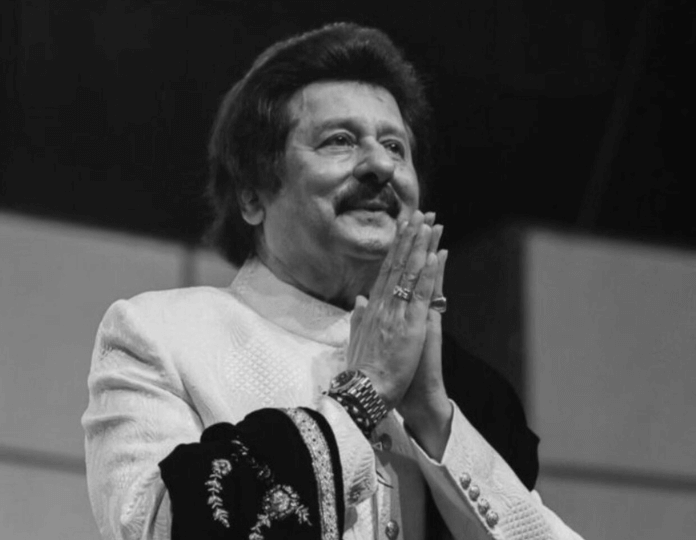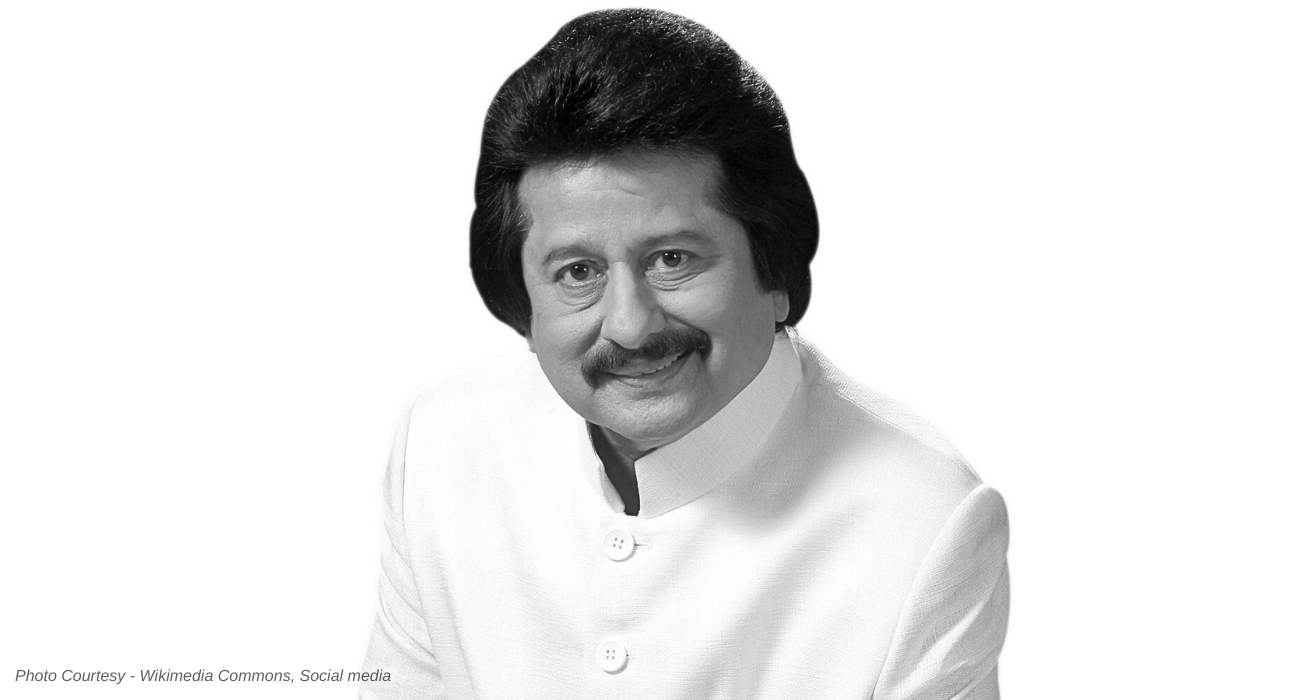His euphonious voice and soulful renditions solidified him as an icon. Pankaj Udhas was a legendary ghazal singer known for his simple and powerful ghazals and geets, such as “Chitthi Aayi Hai,” “Niklo Na Benaqab,” “Aahista Kijiye Baatein,” “Sach Bolta Hoon Main,” “Ghunghru toot gaye,” “Chhupana Bhi Nahin Aata,” “Na Kajre Ki Dhaar,” “Jeeyein Toh Jeeyein Kaise,” “Aaj Phir Tum Pe,” and many more.
Early Life
Pankaj Udhas was born on May 17, 1951, in Jetpur, Gujarat, into a zamindar family known for their love for arts and culture. Pankaj’s grandfather, the first graduate from their village, served as the Diwan of the “Bhavnagar State” and held a significant position in society.
His father, Keshubhai Udhas, and his mother, Jituben Udhas, nurtured his talent from a young age. His father, a government servant with a passion for music, had the fortune of learning the dilruba, a stringed instrument, from the renowned veena player, Abdul Karim Khan.
Musical Training
His brothers, Nirmal and Manhar Udhas, also established singers, were his early influences and companions on his musical journey. Recognising the musical inclinations of their children, Keshubhai and Jituben enrolled them at the Sangeet Academy in Rajkot. Pankaj initially took up the tabla, but his interest soon shifted to Hindustani vocal classical music, which he began learning from Ghulam Qadir Khan Sahab.
Udhas studied at “Sir Bhavsinhji Polytechnic Institute, Bhavanagar, before his family moved to Mumbai, where Pankaj attended St. Xavier’s College. In Mumbai, he continued his musical education under the tutelage of Navrang Nagpurkar, a singer from the Gwalior Gharana. This period of rigorous training and exposure to the rich tapestry of Indian classical music would lay the foundation for Pankaj’s future career.
The Start of a Legendary Career

Udhas’s career began in the late 1970s, but it was the release of his ghazal album ‘Aahat‘ in 1980 that brought him into the limelight. His melodious voice captured the hearts of many, and he quickly became a household name. His subsequent albums, such as ‘Mukarar’ (1981), ‘Tarrannum’ (1982), and ‘Mehfil’ (1983), further cemented his status as a ghazal maestro.
He then released the ghazal album titled Pankaj Udhas Live at Royal Albert Hall in 1984, Nayaab in 1985, and Aafreen in 1986. Throughout his illustrious career, Pankaj Udhas performed at countless concerts, both in India and abroad, bringing the essence of ghazals to the global stage.
Pankaj Udhas – The Soft Voiced Master
Then came “Chitthi Aayee Hai,” from Mahesh Bhatt’s crime thriller Naam (1986) that catapulted him to national fame. The film starring Sanjay Dutt and Kumar Gaurav had the song, which evokes the pain of separation and the longing for one’s homeland. It resonated with listeners across the world espacialy who are away from their loved ones. The song is still cherished as one of the most poignant geet ever sung.
Pankaj Udhas is best known for lending his voice to memorable tracks like “Chandi Jaisa Rang Hai” from Pravin Bhatt’s 1998 film Ek Hi Maqsad, “Aaj Phir Tumpe” from Feroz Khan’s action thriller Dayavan (1988), “Mohabbat Inayat Karam Dekhte Hain” in Bahar Aane tak (1990), “Jeeye To Jeeye Kaise” from Lawrence D’Souza’s 1991 romantic film Saajan (1991), “Dil Deta Hai Ro Ro Duhai” in Mahesh Bhatt’s Phir Teri Kahani Yaad Aayee (1993), “Chhupana Bhi Nahi Aata” in Baazigar (1993), “Dil Jab Se Toot Gaya” in Salami (1994), and “Na Kajre Ki Dhaar” from Mohara (1994), among others.


Other Work
Some of his famous songs and Ghazals include “Niklo Na Benaqab,” “Aahista Kijiye Baatein,” “Sach Bolta Hoon Main,” “Ghunghru toot gaye,” “Ek Taraf Uska Ghar,” “Aye ghame zindagi,” “Thodi Thodi Piya Karo,” “Aap jinke qareeb hote hain,” and many more.
Some of his famous ghazal/geet albums include “Shagufta,” “Nabeel,” “Aashiyana,” “Anjana,” “Ek Dhun Pyar Ki,” “Rubayee,” “Kaif,” and “Khayaal.”
“Aman,” “Woh Ladki Yaad Aati Hai,” “Stolen Moments,” “Mahek,” “Ghoonghat,” “Muskan,” “Dhadkan,” “Lamha,” “Janeman,” “Jashn,” “Rajuat (Gujarati),” “Baisakhi (Punjabi),” “Humnasheen,” “In Search of Meer,” “Hasrat,” “Bhalobasha (Bengali),” “Yaara,” “Shabad (Punjabi),” “Shaayar,” and “Nayaab Lamhe,” among others.
Later Life and Demise
In recognition of his remarkable talent, Pankaj Udhas was honoured with the Padma Shri Award in 2006. His legacy lives on through his timeless melodies, touching the hearts of music lovers across generations.
Sadly, the ghazal world dimmed when Pankaj Udhas passed away on February 26, 2024, after a prolonged illness. Udhas’s legacy, however, continues to live on through his music, which remains a source of comfort and joy to millions. His daughters, Nayaab and Reva Udhas, and his wife, Farida Udhas, survive him. His daughters are carrying forward the legacy of a man who was not just a singer but a poet at heart.
Pankaj Udhas on IMDB














Leave feedback about this